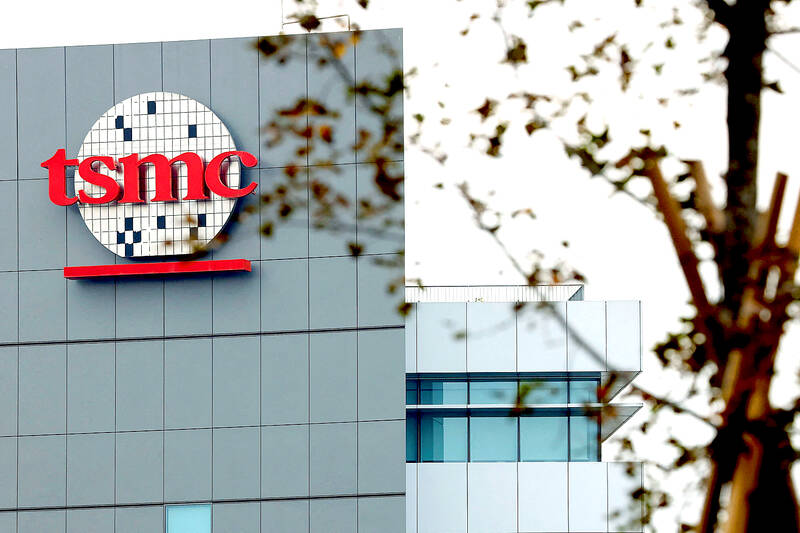Taiwan Semiconductor Manufacturing Co (TSMC, 台積電), the world’s biggest contract chipmaker, is in talks to receive German government subsidies for as much as 50 percent of the costs to build a new semiconductor fab in the country, people familiar with the matter said.
The government is in ongoing negotiations with TSMC, as well as its partners on the project — Bosch Ltd, NXP Semiconductors NV and Infineon Technologies AG — the people said, asking not to be identified because the deliberations are private.
No final decisions have been made and the final subsidy amount could still change. Any state aid must also be signed off by the European Commission.

Photo: Ann Wang, Reuters
The deliberations over the Dresden plant, which could cost as much as 10 billion euros (US$10.7 billion) to build, show how competition for semiconductor manufacturing capacity has intensified. The top end of the subsidies being discussed would put German government support for the fab on par with what Japan is offering TSMC to build a factory there. It would also outpace the 40 percent maximum that most other chipmakers are getting for their plants in Europe.
The German Ministry for Economic Affairs and Climate Action said in a statement that it is in a “close exchange” with TSMC “with the aim of jointly discussing prerequisites for an investment decision.”
The ministry did not comment on the subsidies beyond saying that the government could fund the project under the European Chips Act.
A spokeswoman for TSMC said that the company is evaluating the possibility of building a fab in Europe and declined to comment further.
TSMC chief executive C.C. Wei (魏哲家) last month said that the decision would be based on demand from customers and the level of support from Beijing.
The plant would be a big win for the EU’s 43 billion euro Chips Act, which is aimed at increasing domestic output to avoid supply chain disruptions. STMicroelectronics NV, GlobalFoundries Inc, Infineon Technologies AG and Wolfspeed Inc are among the chipmakers that have announced new investments in Europe since it was first proposed last year.
“The goal is to be close to our customers,” TSMC senior vice president Kevin Zhang (張曉強) said at an industry event in Amsterdam this week.
TSMC’s board would make a final decision about going ahead with the project as soon as August, he said.
“If we do build a fab in Dresden, likely we would start at the 28-nanometer generation,” he said.
Such chips could be used for microcontrollers in vehicles and could be made smaller.

Taiwanese suppliers to Taiwan Semiconductor Manufacturing Co. (TSMC, 台積電) are expected to follow the contract chipmaker’s step to invest in the US, but their relocation may be seven to eight years away, Minister of Economic Affairs J.W. Kuo (郭智輝) said yesterday. When asked by opposition Chinese Nationalist Party (KMT) Legislator Niu Hsu-ting (牛煦庭) in the legislature about growing concerns that TSMC’s huge investments in the US will prompt its suppliers to follow suit, Kuo said based on the chipmaker’s current limited production volume, it is unlikely to lead its supply chain to go there for now. “Unless TSMC completes its planned six

Intel Corp has named Tasha Chuang (莊蓓瑜) to lead Intel Taiwan in a bid to reinforce relations between the company and its Taiwanese partners. The appointment of Chuang as general manager for Intel Taiwan takes effect on Thursday, the firm said in a statement yesterday. Chuang is to lead her team in Taiwan to pursue product development and sales growth in an effort to reinforce the company’s ties with its partners and clients, Intel said. Chuang was previously in charge of managing Intel’s ties with leading Taiwanese PC brand Asustek Computer Inc (華碩), which included helping Asustek strengthen its global businesses, the company

Power supply and electronic components maker Delta Electronics Inc (台達電) yesterday said second-quarter revenue is expected to surpass the first quarter, which rose 30 percent year-on-year to NT$118.92 billion (US$3.71 billion). Revenue this quarter is likely to grow, as US clients have front-loaded orders ahead of US President Donald Trump’s planned tariffs on Taiwanese goods, Delta chairman Ping Cheng (鄭平) said at an earnings conference in Taipei, referring to the 90-day pause in tariff implementation Trump announced on April 9. While situations in the third and fourth quarters remain unclear, “We will not halt our long-term deployments and do not plan to

The New Taiwan dollar and Taiwanese stocks surged on signs that trade tensions between the world’s top two economies might start easing and as US tech earnings boosted the outlook of the nation’s semiconductor exports. The NT dollar strengthened as much as 3.8 percent versus the US dollar to 30.815, the biggest intraday gain since January 2011, closing at NT$31.064. The benchmark TAIEX jumped 2.73 percent to outperform the region’s equity gauges. Outlook for global trade improved after China said it is assessing possible trade talks with the US, providing a boost for the nation’s currency and shares. As the NT dollar